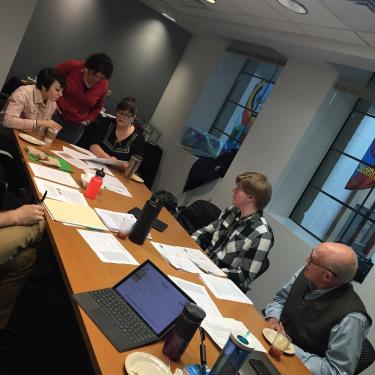 During the 2018 spring semester a new, interim, Honor Code process was implemented to review and resolve allegations of student honor code violations. The process was formally approved by Provost Moore in July 2019 and is now housed in the Office of Student Conduct and Conflict Resolution (SCCR). The new process utilizes an Honor Code Advisory Board (HCAB), which is comprised of the Hearing Officer from SCCR along with four faculty and a pool of students. . A minimum of two faculty and two students are present at each hearing along with the SCCR Honor Code Hearing Officer.The faculty and students who serve on the HCAB are selected annually.
During the 2018 spring semester a new, interim, Honor Code process was implemented to review and resolve allegations of student honor code violations. The process was formally approved by Provost Moore in July 2019 and is now housed in the Office of Student Conduct and Conflict Resolution (SCCR). The new process utilizes an Honor Code Advisory Board (HCAB), which is comprised of the Hearing Officer from SCCR along with four faculty and a pool of students. . A minimum of two faculty and two students are present at each hearing along with the SCCR Honor Code Hearing Officer.The faculty and students who serve on the HCAB are selected annually.
The annual process starts with BFA representatives informing their constituents each fall of the seat openings. Eligible faculty members submit a statement of interest and BFA Executive Committee members then select the final faculty members. Student members are selected by the SCCR office with input whenever possible by CUSG and GPSG. The new process requires that a graduate student must serve on any cases involving graduate students. The new Honor Code process is more efficient, diverse, and properly representative of all potential parties involved in an Honor Code dispute.
Visit the Honor Code website for more information:
- Honor Code Home Page
- Honor Code Pledge, Definitions, and full process information
- Honor Code Information for Faculty
- Frequently Asked Questions
- If you have any questions about the BFA’s role in the honor code, please email us at bfa@colorado.edu. If you have questions about the Honor Code, please contact their office directly: honor@colorado.edu
Each year BFA representatives are asked to inform constituents about the HCAB faculty seats. Interested faculty must submit the annual Statement of Interest and the BFA Executive Committee selects the faculty members for a one year term.
Honor Code Advisory Board faculty members for AY23-24:
